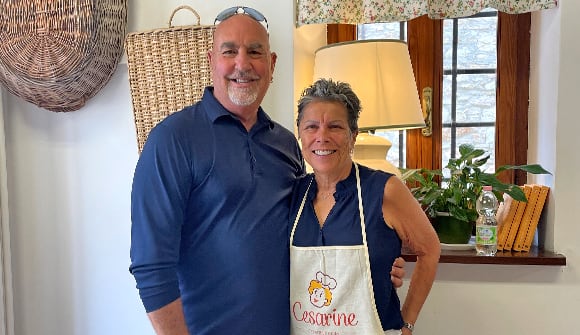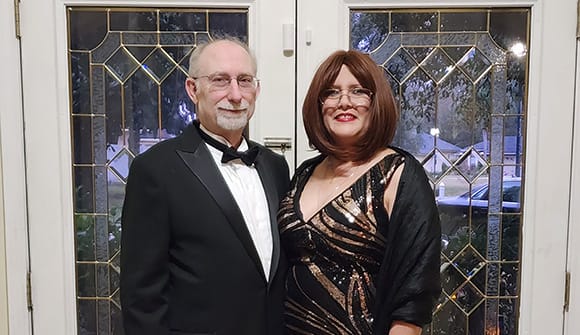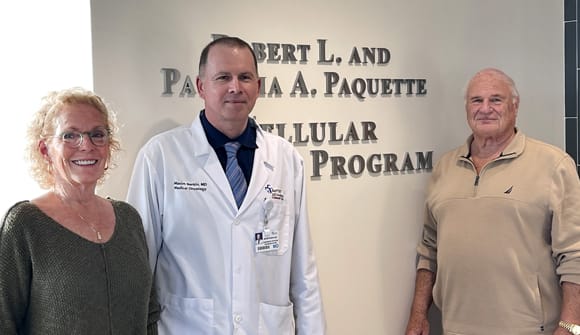Finding out it's cancer
How to support a loved one through diagnosis and treatment.
Article Date:

Someone you hold dear has been diagnosed with cancer and you’re devastated. You want to be strong for them, but you’re weakened by the blow of this life-changing news. How can you offer emotional support to a loved one with cancer when you’re feeling distraught and unsure of what to (or not to) say?
“A cancer diagnosis is an earth-shaking event that affects both the patient and their loved ones,” said Alicia Laconich, PhD, a psychologist at Baptist MD Anderson Cancer Center. “Beyond the physical, there is a heavy emotional toll as patients may experience fear, anxiety, depression and a sense of being a burden to their loved ones. They might also feel a loss of identity as their life is consumed by appointments and treatments, and their ability to work or engage in hobbies is diminished.”
The good news is that your presence matters. You don’t have to have the perfect words. What matters most is being understanding, accepting and present.
Help maintain a sense of normalcy and purpose
“While cancer is a major part of life, it shouldn’t be the sole topic of conversation,” shared Dr. Laconich. “Research shows that cancer patients with a stronger sense of purpose often experience better outcomes, including improved mood and tolerance to physical symptoms as well as higher overall quality of life.”
- Talk about life. Topics can range from hobbies, family memories and other interests.
- Include your loved one. Make them a part of activities and decisions, even if they can't fully participate.
- Encourage routines and adapt interests. If they love gardening, help tend to potted plants indoors.
Lend a hand
You don’t need to wait to be asked for help. Cook meals, shop for groceries or offer to do some of the household chores your loved one may be too overwhelmed to tackle.
Educate yourself about the type of cancer your loved one has. Make sure both of you have a good understanding of all the treatment options, along with potential risks or side effects.
Try to attend appointments and assist with medical logistics. The amount of information a patient gets during doctors’ visits can be overwhelming, and it can be helpful to have a second set of ears. This can help ensure that important information isn't missed due to attention and memory issues, or "chemobrain," which are common cognitive changes caused by cancer itself and/or treatments. Help by taking notes during appointments, keeping a list of questions to ask the medical team, organizing medications and keeping all records in one place with contact information for the health care team easily accessible.
What not to do
- Don’t give advice. You don’t need to share what your co-worker did when she had cancer. Each individual has a unique experience.
- Don’t have an expectation of how your loved one is supposed to act. For example, he or she may be irritable or quiet.
- Don’t judge their treatment decision (even if you disagree). That choice is between your loved one and their doctor.
- Don’t tell them not to worry. It’s not helpful. You're dismissing their emotions and minimizing their fear or concern.
What to do instead
- Listen without judgment. Sometimes, the most powerful support you can give is simply letting your loved one feel heard.
- Say, “I love you,” often. Give hugs.
- Offer reassurance that you will be there. Let your loved one know that you will try to help with anything they may need.
- Reflect their emotions and be honest. For example, say, “I know you’re scared. I’m scared, too.”
Look after yourself, too
Remember, your well-being is directly linked to the quality of support you’re able to provide.
- Schedule "off-duty" time. Take regular breaks to decompress and recharge.
- Seek your own support. Accept help from other family members or friends. Consider joining a support group or talking with a mental health professional.
Need help processing a cancer diagnosis?
To schedule an appointment with one of our psychologists, ask your Baptist MD Anderson Cancer Center physician for a referral. You can also call Baptist Behavioral Health directly at 904.376.3800, option 1, to request an appointment with a Baptist MD Anderson psychologist.



